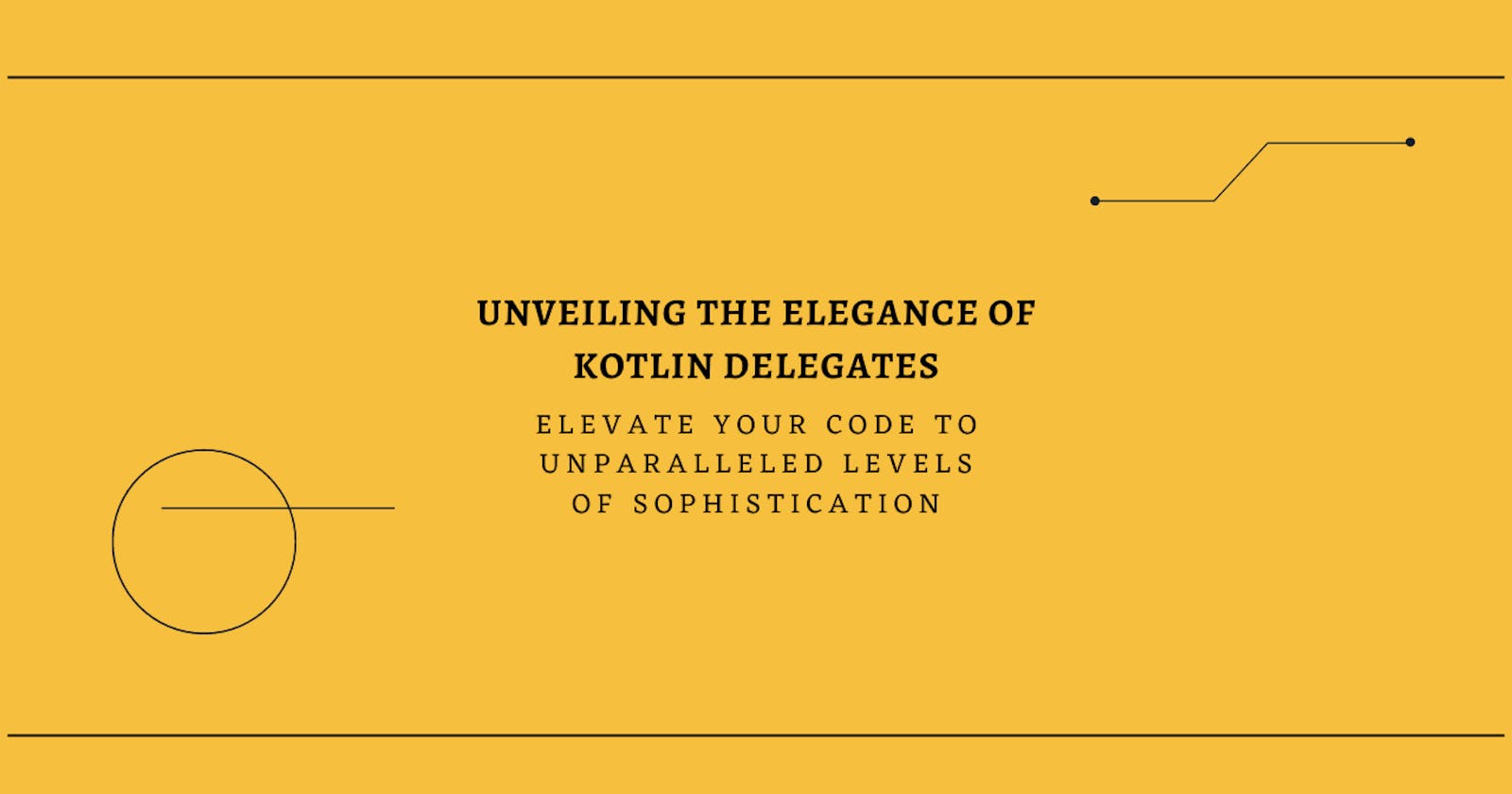Unveiling the Elegance of Kotlin Delegates: Elevate Your Code to Unparalleled Levels of Sophistication
Introduction
In the realm of Kotlin programming, there exists a hidden gem known as delegates. These delegates possess an exquisite power to transform your code into a symphony of elegance, simplifying complexity and bestowing a touch of opulence. In this opulent blog post, we shall embark on a journey to unravel the enchanting world of Kotlin delegates, exploring their breathtaking capabilities and reveling in the sheer luxury of their implementation.
What are Kotlin Delegates?
Ah, dear reader, let us embark on this majestic exploration by delving into the very essence of Kotlin delegates. In this realm, delegates are veritable conduits, enabling the delegation of property implementation to another entity. In simpler terms, delegates allow us to bestow the responsibility of getter and setter methods upon a separate class, casting away the shackles of repetitive code. This divine mechanism promotes the noble virtues of code reuse, separation of concerns, and the sacred art of modular design.
Delegates in Action
Now, let us step into a world adorned with code snippets, where the true magnificence of Kotlin delegates shall be revealed.
1. Lazy Delegates: Indulge in Laziness
Imagine, dear reader, a property that is brought to life only when first sought after, a property that embodies the very essence of laziness. With the luxurious lazy delegate, such a property can be summoned into existence with unparalleled elegance. Behold:
val expensiveObject: ExpensiveObject by lazy {
// Indulge in the luxurious initialization of the expensive object
ExpensiveObject()
}
In this resplendent snippet, we behold the declaration of the expensiveObject property, adorned with the lazy delegate. The sumptuous initialization within the curly braces shall be executed only upon the first access of the property. This opulence is particularly delightful when dealing with ostentatious operations or hefty resources.
2. Observable Delegates: Witness the Symphony of Change
Dear reader, imagine being able to listen to the whispers of change in a property, to dance with delight as its value metamorphoses. With the enchanting ObservableProperty delegate from the Kotlin standard library, this dream becomes a tantalizing reality. Gaze upon this spectacle:
var name: String by Delegates.observable("") { _, oldName, newName ->
println("A grand transformation has occurred! The name has changed from $oldName to $newName")
}
In this mesmerizing code snippet, the name property is graced with the observable delegate. Whenever the value of name undergoes a profound transformation, the lambda expression is summoned into existence, revealing the old and new values. Here lies the key to custom logic and the orchestration of symphonies within your code.
3. Map Delegates: The Tapestry of Property Mapping
Ah, dear reader, imagine a realm where properties are woven into a tapestry of maps, where the manipulation of data becomes a sight to behold. Enter the captivating world of map delegates, where properties are bestowed upon entries within a Map object, rendering data access and manipulation a marvel of convenience. Behold:
class User(val map: Map<String, Any>) {
val name: String by map
val age: Int by map
}
val user = User(mapOf("name" to "John Doe", "age" to 25))
println(user.name) // Ah, behold! The name emerges: John Doe
println(user.age) // And lo, the age is revealed: 25
In this resplendent code, the User class adorns itself with map delegates, gracefully assigning properties from a Map object. Henceforth, the properties may be accessed directly, as if they were esteemed members of the class.
4. Custom Delegates: Unleash the Power of Customization
Dear reader, let us now venture into a realm of boundless creativity and customization. Kotlin bestows upon us the power to create custom delegates, where the very essence of property behavior can be sculpted to our desires. Witness this spectacle:
class UpperCaseDelegate {
private var value: String = ""
operator fun getValue(thisRef: Any?, property: KProperty<*>): String {
return value.toUpperCase()
}
operator fun setValue(thisRef: Any?, property: KProperty<*>, newValue: String) {
value = newValue.toUpperCase()
}
}
class Person {
var name: String by UpperCaseDelegate()
}
val person = Person()
person.name = "John Doe"
println(person.name) // Ah, behold! The name is transformed: JOHN DOE
In this resplendent code snippet, we unleash the power of custom delegates, fashioning a delegate known as UpperCaseDelegate. This exquisite delegate adorns the assigned value with regal uppercasing, both when retrieving and setting the property. By adorning the name property of the Person class with this custom delegate, we ensure that the name is forever stored and retrieved in an elevated state of uppercase grandeur.
Conclusion
Dear reader, Kotlin delegates are a grand tapestry through which your code shall ascend to unprecedented heights of sophistication. They grant you the divine power to simplify complexity, to reduce the burden of repetitive code, and to create a symphony of elegance within your programs. Whether you seek the indulgence of laziness, the orchestration of change, the marvels of property mapping, or the boundless power of customization, Kotlin delegates shall be your steadfast companions. Embrace this opulent gift bestowed upon you and elevate your code to unparalleled levels of sophistication. May your programming journey be adorned with elegance and your code resonate with the grandeur of Kotlin delegates.
